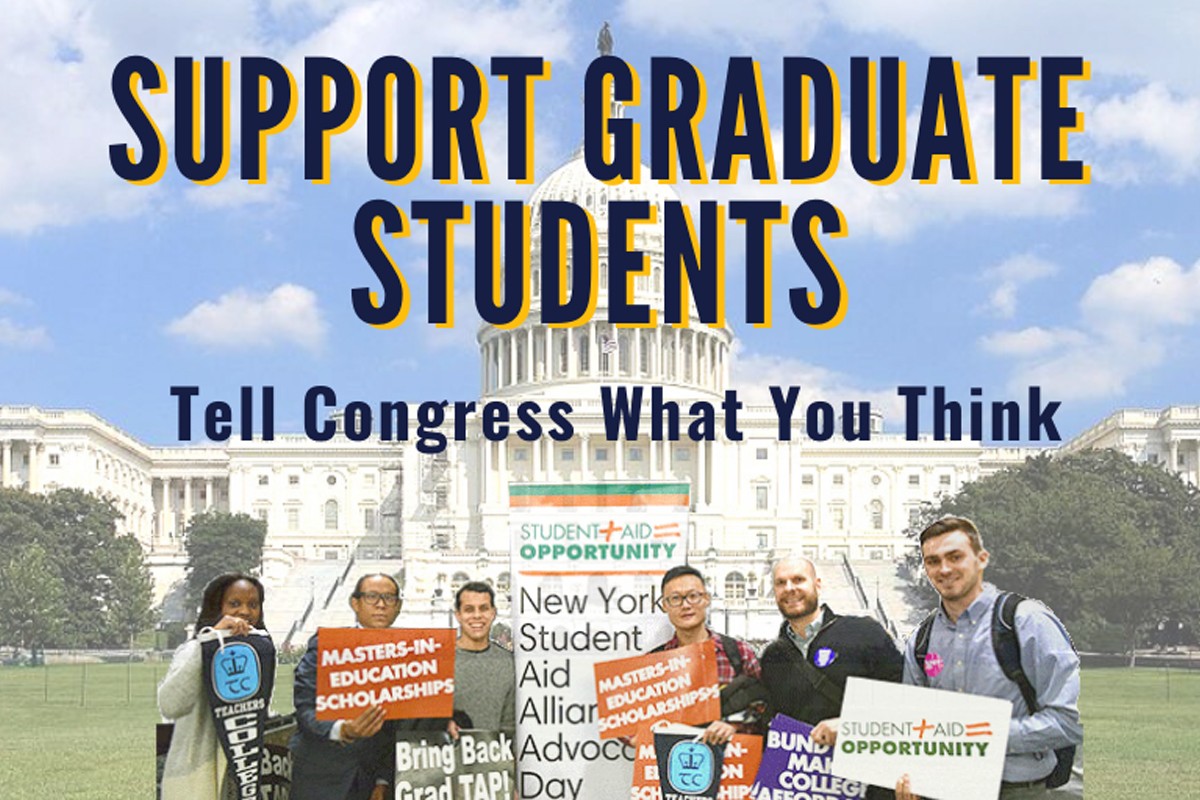With coronavirus cases surging nationally and many states pausing in their plans to “reopen for business,” Congress could unveil its next economic stimulus package by the end of July.
At Teachers College, the Advocacy Academy especially wants to make sure that the end result helps graduate schools and their students — particularly international students, who face some daunting challenges to continuing their education.
“Many graduate school students, and especially preservice teachers, are going into public service and need a lot of support,” says Advocacy Academy leader Matthew J. Camp, TC’s Director of Government Relations, who is also a doctoral student in the Department of Education Policy & Social Analysis and an adjunct professor of advocacy at NYU. “Often the focus is only on undergraduate institutions and students, which is necessary—but rarely is there specific language in legislation that singles out grad schools as a target for aid. Recently, Congress has even talked about taxing graduate student stipends,”
Now, Camp adds, the Trump administration is issuing rules that will deny visas to international students if the U.S. institutions they are attending are providing instruction entirely online. Such a ruling would force many international students to leave the country and severely affect revenues for the universities where they are enrolled.
Camp emphasizes that “there is a small window open to act now, before the regulations are fully approved.”
Rarely is there specific language in legislation that singles out grad schools as a target for aid. Often the focus is only on undergraduate institutions and students — and more recently, Congress has even talked about taxing graduate student stipends.”
—Matthew Camp
This coming Wednesday, from 3pm to 4:30pm the Advocacy Academy will hold on online “letter-writing party” for TC students, faculty, staff and alumni. The group will provide a core letter, drafted by the Commission on Independent Colleges and University (CICU), that summarizes the ways that graduate institutions contribute to the public good.
[Click here to register for the event.]
Participants will be asked to add a brief personal statement — for example, TC students might outline their career plans and describe their financial need. Members of the Advocacy Academy will be available to provide online tips for drafting these statements. When participants add their addresses to the completed letters, their elected representatives’ names and contact information will pop up onscreen.

RESOURCEFUL RESPONSE Walrond and other students are looking for ways to replace funding diminished by the COVID pandemic. (Photo: TC Archives)
“We’re not yet at the point of calling for specific legislation or a specific dollar amount,” Camp says. “The ask is really to support graduate students who are going into public facing sectors and fields. We’re saying, ‘Hey, we’re here, in your district, making a difference, and we need you to help us.’ And the fact is that politicians who care about these issues want to get these kinds of letters. A legislator like Jerry Nadler or Adriano Espaillat might share our stories with their colleagues in Congress.”
The Advocacy Academy has been a TC campus presence for the past three years. Previously, it has held workshops for TC community members on how to run for office, how to write an op-ed, and how to build a movement a particular issue or set of issues.
“Part of our goal has been to build habits of civic engagement,” Camp says.
“As the distinguished TC alumna, Shirley Chisholm said, ‘You don't make progress by standing on the sidelines, whimpering and complaining — you make progress by implementing ideas,’” says Honey Walrond, an M.Ed student in International & Comparative Education who serves as on the TC Student Senate E-Board as Communications Office and also is a research assistant at the College’s Institute for Urban and Minority Education. “And I think this is what the Advocacy Letter Writing event is all about — coming together to make progress and change when it comes to graduate student funding. Many students, including myself, who may not have a full scholarship, continue to find ways to fund our education. For a lot of students, COVID-19 took many funding opportunities away, such as work-study, research grants, etc. The Write-In to Congress is a way for the TC community to come together in making sure student voices are heard and to raise awareness on advocating for graduate student funding in the next stimulus legislation.”
The group has worked with TC’s Student Senate and Office of Alumni Relations to get the word out about this Wednesday’s event.
Many students, including myself, who may not have a full scholarship, continue to find ways to fund our education. For a lot of students, COVID-19 took many funding opportunities away, such as work-study, research grants, etc. The Write-In to Congress is a way for the TC community to come together in making sure student voices are heard and to raise awareness on advocating for graduate student funding in the next stimulus legislation.
—Honey Walrond
“One of TC’s mantras since the COVID crisis began has been ‘come together,’ and this is a wonderful instance of students, faculty, staff and alumni doing just that,” Camp says. “And it’s actually easier for us to do it online, because we’re better able to enlist participation from people all around the country.”
Camp calls Wednesday’s event “just the beginning” and says he expects the Advocacy Academy to continue partnering with TC’s Student Senate and alumni on financial aid and other issues during the late summer and fall.
“The big one will be getting people to register to vote,” he says. “As an institution of higher education, we’re actually responsible for doing that.
“They say that ninety percent of life is showing up. And on all these different issues, we’re really trying to provide spaces for people to realize their own political power.”
